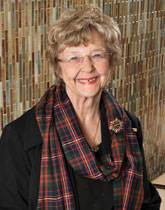Carnegie Mellon has always been a world of openness.
This past fall, the Alumni Association opened its ranks and inducted me as an honorary alumna. The officers promised that, as an alum, I would be better at everything I do.
In several key areas from the global to the local, more and more of the information students need is open to them on the Web, and more help with their learning is here on campus. Books opening their covers, research knowledge opening to citizens, and tutoring opening for CMU students are parts of my adventures in openness.

In a partnership with Raj Reddy, Jaime Carbonnell, and Michael Shamos from Computer Science beginning about 10 years ago, we received National Science Foundation funding for the Million Book project, which digitized over 2 million books and brought them to the web. This work was largely done in China and India, with many of the books being in Chinese and Indian languages. This project helped inspire Google to digitize 20 million books in the United States in the Google Library Project. Google asked me to be an expert witness on their behalf in the Authors Guild case against them. The Authors Guild would like to have those books removed from the Web because Google did not seek permission to digitize them. Students and citizens alike benefit enormously from having all of these books open to search even though the public can only read a small portion of the books still under copyright.
Similarly, over the last decade in the United States and elsewhere, much scientific information published in article form has become open. The Open Access movement has encouraged faculty to bring their own work to the Web either on their own home pages or through software systems that their libraries run. The National Institutes of Health mandated that all the articles written from NIH-funded grants must be deposited in their PubMedCentral system within a year of publication. Thus, citizens are able to read research results that may shape their health decisions. A next step will be to push for public access to the data behind these articles.
In our own Hunt Library, the university has just opened a newly remodeled first-floor study space to great acclaim from students. The addition of a Global Communications Center, which offers writing, presentation, and design tutoring for students, is a superb addition to the methods Carnegie Mellon uses to help students thrive in our challenging educational environment. Next spring and summer, we will be remodeling Sorrells Engineering and Science Library, named for my late partner Roger Sorrells, to serve students better.
All of these projects will continue to receive my energies, now enhanced by my new status as a CMU alum. Because my heart is truly in the work of opening content, I am just beginning a new project called Olive, an archive for executable content. Olive will open all those old softwares so that we can interact with old documents and play favorite old games.
—Gloriana St. Clair (HA’12)
St. Clair, the dean of University Libraries, was named an honorary alumna for her contributions to Carnegie Mellon beyond the responsibilities of her position. She is a mentor to and advocate for students and is a volunteer at the university’s Osher Lifelong Learning Institute.
Related Links:
St. Clair Leads Carnegie Mellon's Research Showcase Digital Initiative



